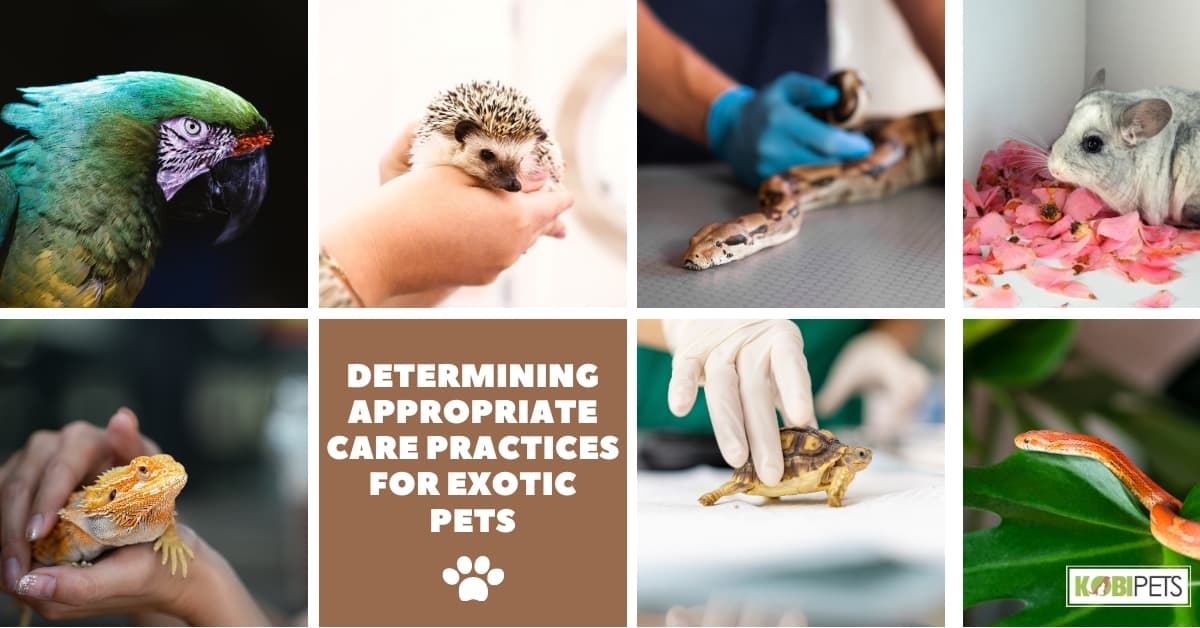
Exotic pet care can be complex and requires specialized knowledge. It is important to research proper care practices, including diet and habitat requirements, to ensure your pet’s health and well-being. Owning an exotic pet is a big responsibility and it’s essential to be informed and prepared to provide the best possible care for your pet.
In this blog, we’ll provide you with tips and advice for determining appropriate care practices for your exotic pet so that it can thrive and enjoy a long, healthy life!
Importance of Proper Care For Exotic Pets
The care of exotic pets is essential for their health and well-being. Regular veterinary check-ups are important for these animals, especially to ensure that the proper environment is being provided for them.
Providing a well-balanced diet with plenty of variety, an appropriate enclosure (not too large or too small), and regular time to socialize are all important elements in providing proper care to exotic pets. Additionally, not all exotic pets can live together peacefully, so it’s important to research what type of species will be able to successfully share the same living space without causing any harm.
Proper care isn’t just about nutrition; it also includes meeting the emotional needs of these animals. Animals respond best when they are kept in a predictable routine and feel safe within their environment. By taking the time and effort to properly care for an exotic pet, owners ensure that their pet has a long and happy life ahead of them.
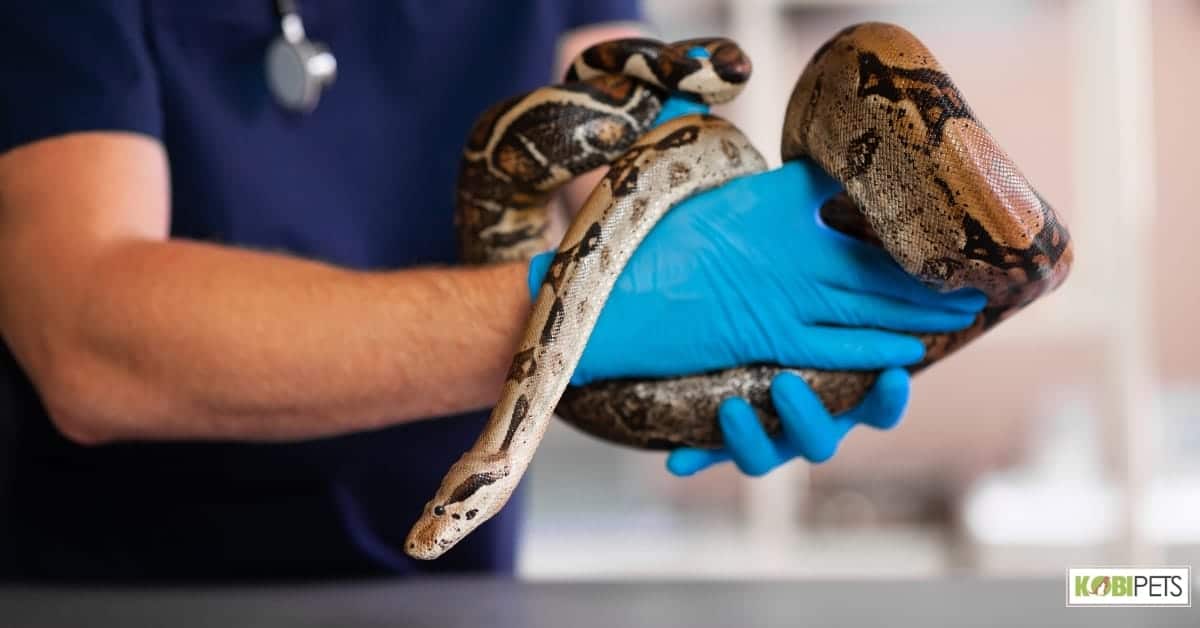
Researching the Specific Needs of Your Exotic Pet
Exotic pets are unique animals that require extra attention, training, and specialized care. When considering an exotic pet as a companion, it is important to research the specific needs of your pet before making a commitment.
With the help of experts knowledgeable about the animal’s particular requirements, you can create lifelong plans surrounding housing and diet that best suit your exotic pet’s health and well-being.
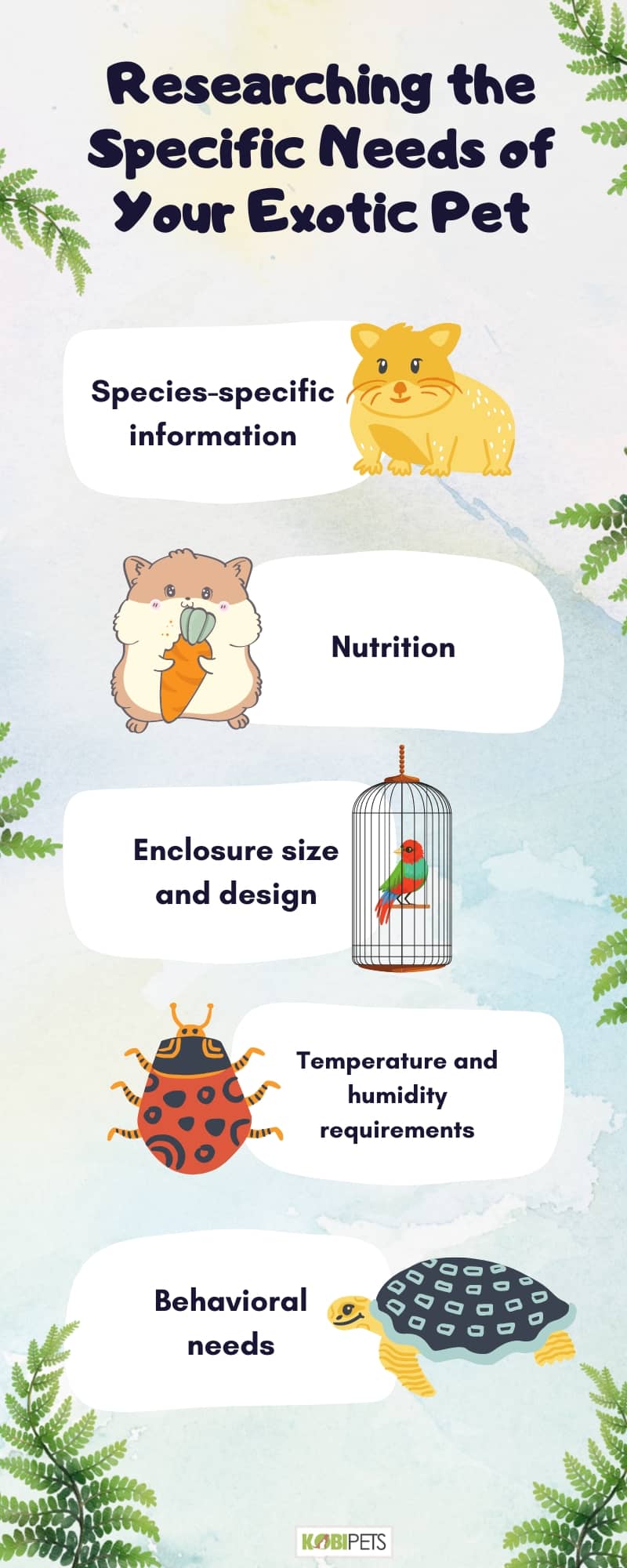
Species-specific information
Researching the specific needs of your exotic pet can be an invaluable step in providing them with a happy, healthy home. Every species is different and has its respective requirements for temperature, humidity levels, nutrition, and space that you’ll need to accommodate.
Keeping up with the latest science on best practices in husbandry can greatly increase the quality of life of an animal, as well as its comfort level. Specific information is easy to dig up online; read materials written by legitimate experts to stay updated.
Online forums are another goldmine for knowledge – there are many experienced owners willing to help make sure your pet is taken care of according to their needs.
Nutrition
It can be challenging to provide adequate nutrition to an exotic pet, depending on the species, as their dietary needs change throughout life. For many animals, wild or captive-bred, their diets should include a variety of foods from both the plant and animal kingdoms; this includes all vitamins and minerals essential for a healthy, long life.
Depending on your pet’s unique characteristics (e.g. temperament, activity level) research should be done and precautions taken in order to properly meet their nutritional requirements. Be sure to only purchase food from a trusted source and constantly review information about flavor preferences; this will help ensure that snacks and treats serve as effective training aids rather than just another unbalanced meal on occasion.
Enclosure size and design
For any exotic pet enthusiast, providing your pet with the best conditions involves considering factors such as enclosure size and design. Getting this right is essential for both the health of your beloved pet and for optimal results when researching the specific needs of your exotic animal species.
When deciding on an enclosure size, you’ll need to think about an animal’s behavior, nutrition requirements, natural terrain, and climate preferences if you want to provide a safe and healthy habitat. The specifics of designing the enclosure will vary depending on the type of pet.
Smaller enclosures will suffice for some species while others may need more horizontal space so they can move around and fully express their behavior (such as jumping or flying). Be sure to research what type of environment is best suited for your particular pet in order to meet its individual needs while still being mindful of safety regulations.
Temperature and humidity requirements
Temperature and humidity play an essential role in providing the ideal habitat for any pet, particularly those with exotic needs. Researching precise temperature and humidity requirements is key to setting up the ideal environment for your furry friend.
Finding the right balance can be tricky but with a bit of research, you’ll know what temperatures and humidities will offer your precious pet the ultimate comfort. If you keep certain factors in mind, such as the natural habitat of your species or its geographical origin, this may help guide you in setting up your perfect home.
Ultimately, finding a happy medium between the two readings that make your pet comfortable is key.
Behavioral needs
Taking proper care of exotic pets requires a great degree of research and understanding. As with common domesticated pets, the needs vary from species to species, but exotic animals may require specialized diets or require special environmental conditions.
Researching the specific needs of your exotic pet will not only help ensure that their well-being is met, but it will also help you create an enriching environment for them to thrive. Furthermore, learning the behavioral patterns of our pet can be beneficial to its development and provide insight into how to best support them both physically and mentally.
Researching what resources are needed to take care of an exotic pet is a vital step in proper animal husbandry.
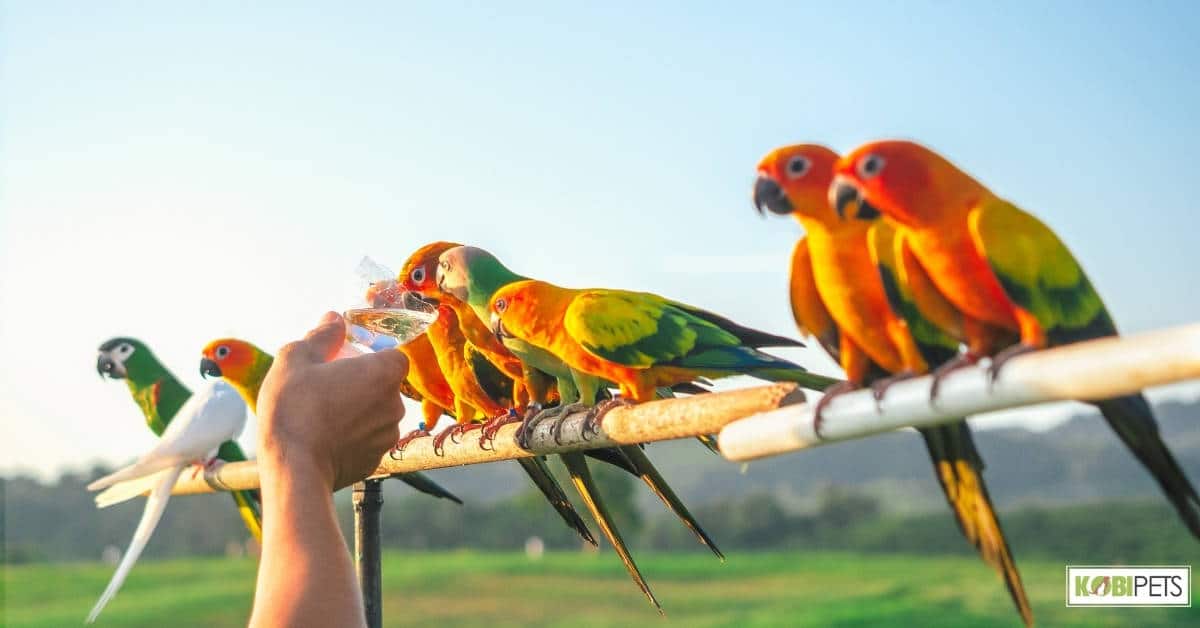
Importance of Finding a Veterinarian Experienced With Exotic Pets
Finding a skilled and experienced veterinarian is essential for pet owners of exotic animals. From ferrets and guinea pigs to iguanas and bearded dragons, exotic pets require specialized care from knowledgeable veterinarians.
This expert care is necessary in order to ensure that your pet gets the best treatments for its unique needs. A veterinarian experienced with these types of animals will have a better understanding of how to diagnose and treat any medical issues that may arise over time.
Additionally, they will be better equipped to provide nutritional advice and identify any issues before they become too serious or costly. When considering an exotic pet as part of the family, make sure you do your research to find a veterinarian who can provide your pet the best care according to its species-specific needs.
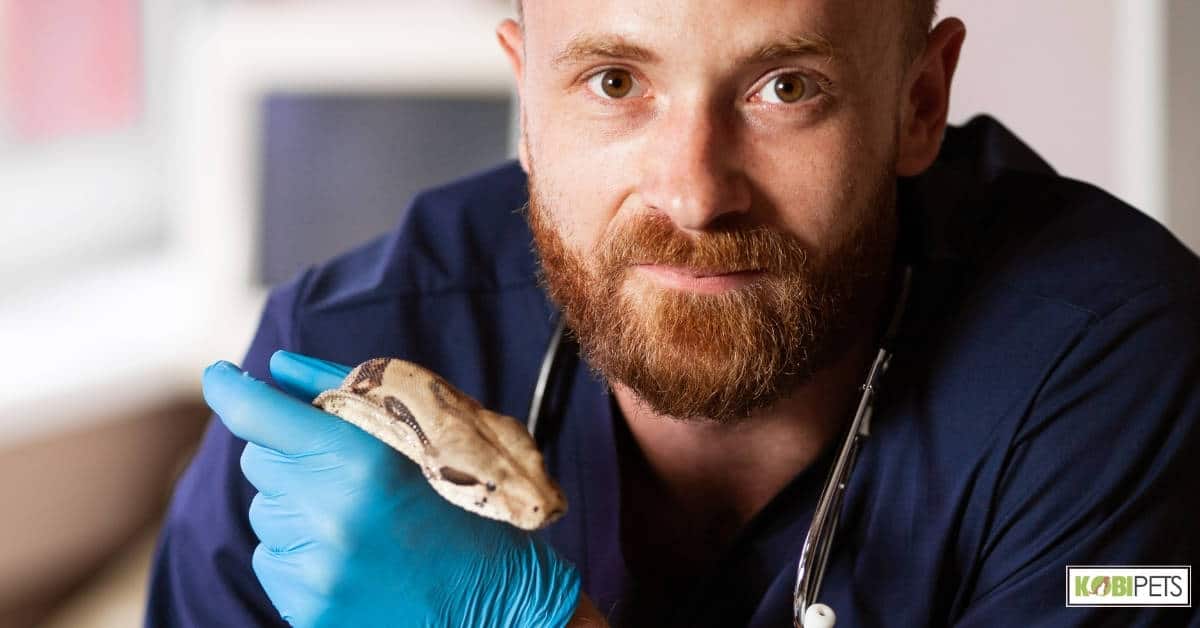
How to Locate a Qualified Exotic Pet Veterinarian
Finding a qualified exotic pet veterinarian can be a challenge, but it’s essential for the health and well-being of your pet. Here are some steps you can take to locate a qualified exotic pet veterinarian:
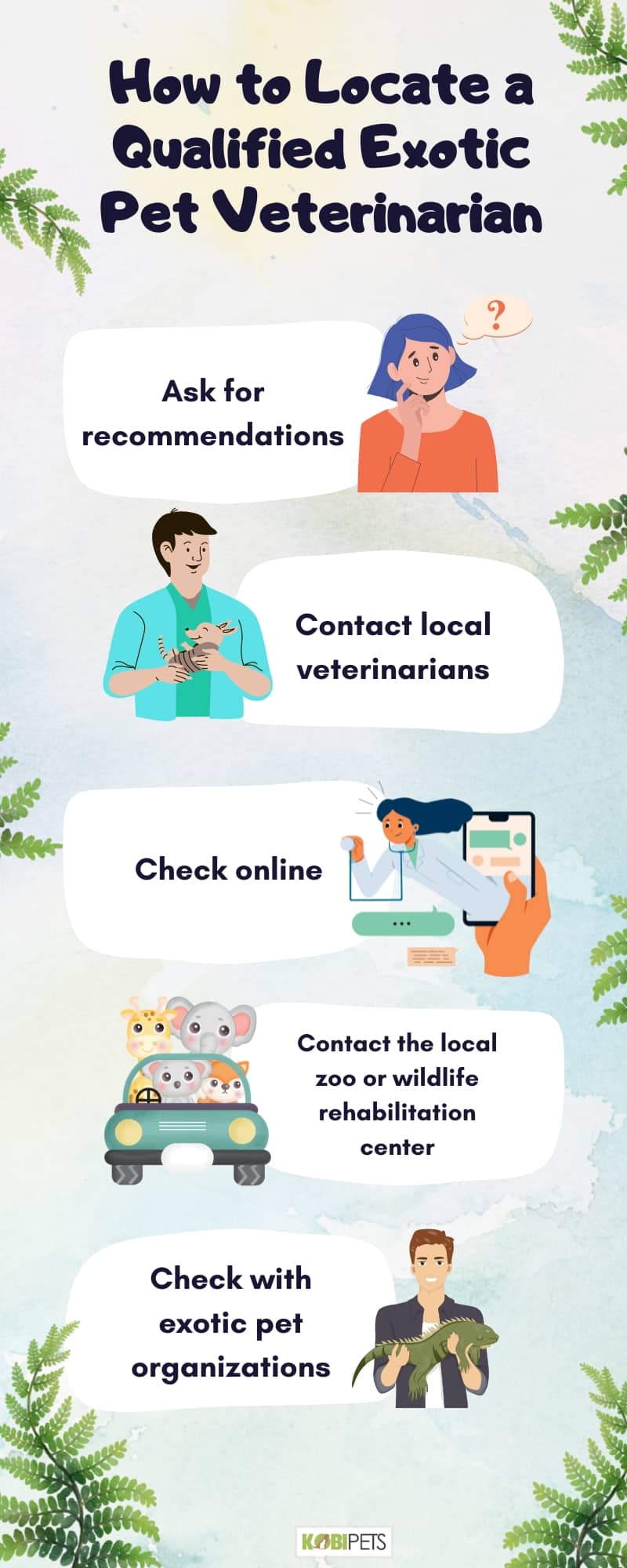
How to Locate a Qualified Exotic Pet Veterinarian
Ask for recommendations
Ask other exotic pet owners for recommendations. They may have already found a veterinarian who is experienced in treating exotic pets and can provide valuable information about their experience.
Contact local veterinarians
Contact local veterinarians and ask if they have experience treating exotic pets. Many veterinarians may not have experience with exotic pets, but they may know of a colleague who does.
Check online
Look up exotic pet veterinarians in your area online. You can search for them in the Association of Avian Veterinarians, the Association of Reptilian and Amphibian Veterinarians, or the Association of Exotic Mammal Veterinarians.
Contact the local zoo or wildlife rehabilitation center
Contact the local zoo or wildlife rehabilitation center and ask if they have a veterinarian on staff who treats exotic pets. These veterinarians may have experience treating a wide variety of exotic animals and can provide valuable information about caring for your pet.
Check with exotic pet organizations
Check with exotic pet organizations, such as the International Association of Exotic Animal Veterinarians or the Association of Exotic Mammal Veterinarians, for a list of qualified veterinarians in your area.
It’s important to remember that not all veterinarians have the same level of expertise and experience when it comes to exotic pets. It’s better to invest the time in finding a qualified veterinarian who can provide proper care for your pet, rather than risking its health by going to a veterinarian who is not specialized in exotic pets.
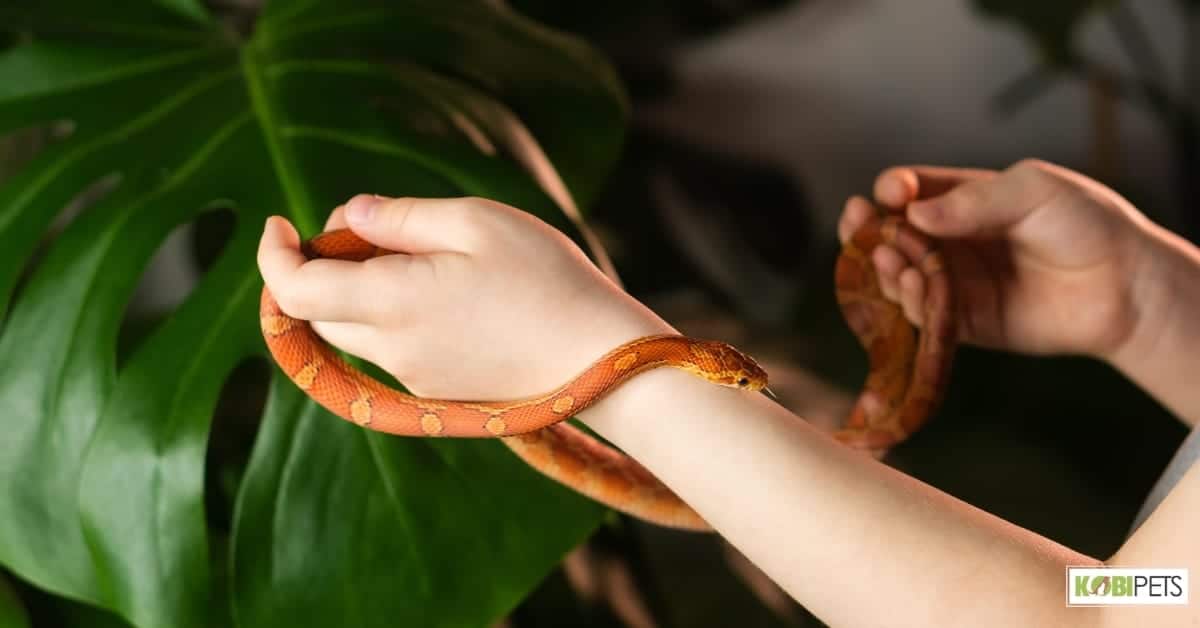
Providing Appropriate Care in the Home
Proper nutrition and feeding
Proper nutrition is essential for providing appropriate care for exotic pets, such as reptiles and amphibians. As the owner of an exotic pet, it is important to understand what their natural diet and habitat consist of in order to ensure their health and well-being.
Different species of pets require different foods and may need various specialized items that are not common household items. Additionally, there is an increasing amount of research available today that provides alternatives to traditional diets.
While attempts should be made to replicate what these creatures consume in the wild, it is still sometimes necessary to resort to dietary supplementation to meet nutritional requirements. Planning proper feeding schedules depending on the type and size of the pet can also help maintain a healthy lifestyle.
Ultimately, taking the time to prepare appropriate meals and adequately research the nutritional needs of each species paired with regular veterinary checkups will help keep your pet happy and healthy!
Enclosure maintenance
Ensuring the safety and well-being of exotic pets that live in a home environment begins with providing them with adequate enclosure maintenance. Maintenance of these enclosures is critical to helping reduce stress and illness on the part of the pet while providing them with comfortable, secure habitats within a home.
This involves making regular assessments of both their physical and biological needs, such as structural integrity, temperature control, lighting and ventilation, cleanliness and bedding, appropriate diet and nutrition, stimulation items, and opportunities for proper exercise or activity.
Proper enclosure maintenance also means taking default steps to limit the potential spread of infection amongst similar animals or living things outside the enclosure. Accommodations for an exotic pets should not be taken lightly as they require more specialized attention than more common pets.
With dedication from the pet parent comes peace of mind and protection from harm for our beloved companions.
Temperature and humidity control
Temperature and humidity control is essential for providing appropriate care for exotic pets in the home. Many species of reptiles, amphibians, and invertebrates like snails and crabs thrive when their environment mimics their natural habitat. I
t is important to note that individual species have different temperature and humidity requirements. Animal caregivers should strive to find the optimal temperature and humidity settings for their pets by researching online or consulting a veterinarian with expertise in exotic pets.
To regulate temperature and humidity, many enclosures come with lighting systems that generate heat, as well as foggers or misters to create appropriate levels of moisture in the air. Though they can be expensive to purchase and maintain, these tools are essential to provide optimal living conditions for your pet so they can live a long, healthy life.
Socialization and exercise
Socializing and exercising exotic pets is essential for providing proper care in a home setting. Starting in the pet’s early life makes it easier to get them accustomed to humans, objects, sounds, and other animals.
Daily walks are important for dogs, and regular mental stimulation is necessary for cats, lizards, snakes, and birds. Making sure their environment has suitable hiding places and plenty of space to show off their natural behaviors and instincts helps the animal feel safe, secure and loved.
Additionally, socialization can help any pet overcome fear or apprehensions that stem from a lack of experience with people or certain situations. It is an important part of keeping a happy and healthy pet.
Health monitoring and preventative care
Pet owners need to be aware that exotic pets require much more than just a nutritious diet, cage, and access to water.
Proper health monitoring and preventative care for exotic pets should include regular examination by a veterinarian knowledgeable in their species, internal parasite prevention as well as routine preventative medications like dewormers and flea/tick treatments.
Diagnostic testing can help to identify diseases before they become clinically apparent. With proper monitoring, proactive management of their health, appropriate environmental requirements, and a tasty diet with adequate nutrition; pet owners can ensure their exotic pet stays happy and healthy in their home.
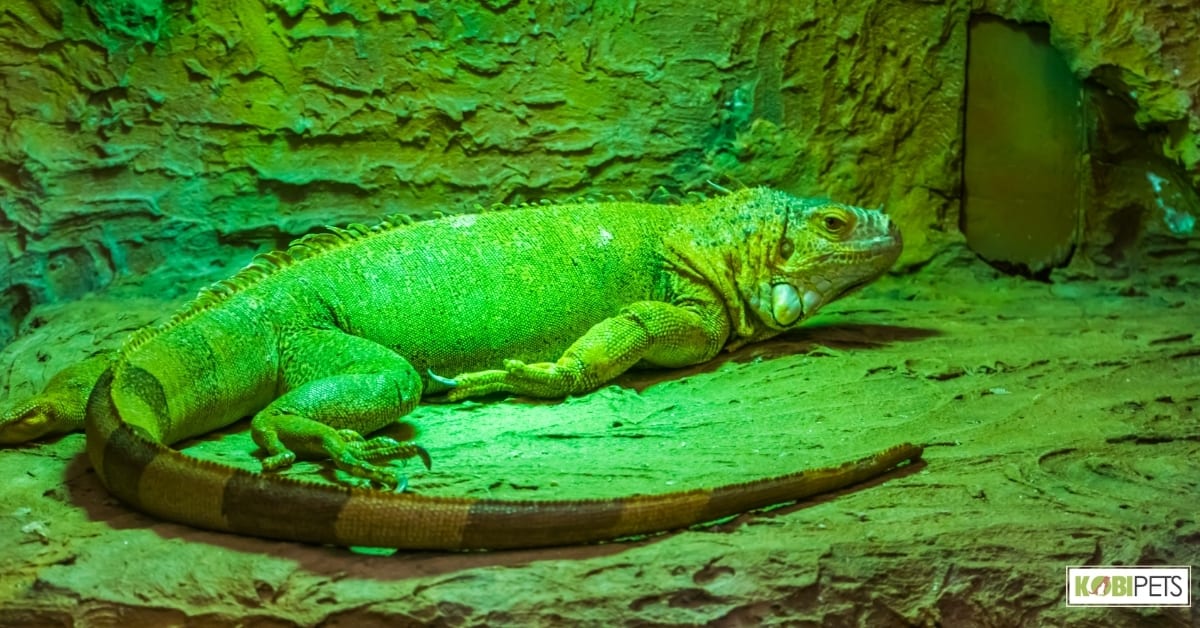
In Conclusion
Providing adequate care for exotic pets is a big responsibility. It requires a lot of research and understanding of their specific needs to ensure that the pet gets the best possible treatments and environment.
Finding the right veterinarian, providing proper nutrition and feeding, maintaining their enclosure, controlling temperature and humidity levels, socializing and exercising them regularly, and monitoring their health are all important steps to providing the best care for your exotic pet.


